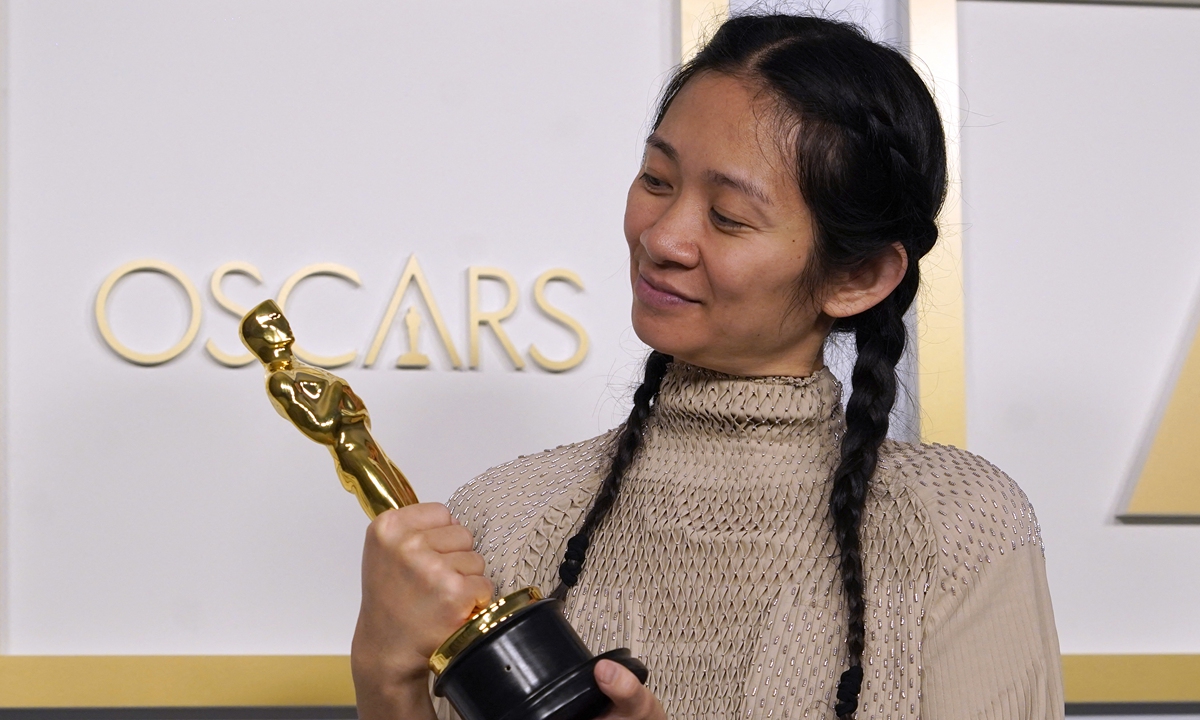
Chloe Zhao poses in the press room at the Oscars on Sunday. Photo: AFP
Chloe Zhao, director of the film Nomadland, became the first Asian-American woman to have won the Oscars for best director on Sunday night US local time. This is supposed to be a moment of applause and flowers, yet it is somehow mixed with certain doubts - Did Zhao change the 93-year history of the Academy Award by the absolute strength of her work? Or did the Academy attempt to appease the tension in US society triggered by anti-Asian hate crimes?
When US media outlets keep underlying that Zhao was "the first female of color and first Asian-American woman to win the prestigious prize," they are actually suggesting time and again how deep-rooted racism and sexism is in US society - it took 93 years to present the award to an Asian-American woman for the very first time. Before her, "only five women, all White, had ever been nominated and only one had won," CNN reported on Monday.
In addition, Youn Yuh-jung, a South Korean actress, also has made Oscars' history this year as the first Korean performer to win Academy Award for best supporting actress. The awards mirror that discrimination is still mainstream in Hollywood, but don't worry, political correctness will come once in a while.
However, the Academy Award seems to have tried so hard sometimes that some of its selected prize-winning films have drawn waves of controversies.
When Moonlight defeated La La Land to win the Oscar for best picture in 2017, the result made quite a few film fans stunningly upset. Black Panther, a superhero movie with a cast of about 90 percent African and African-American, takes home three Oscars and became the first superhero film to be nominated for best picture.
Commercial blockbusters rarely win the Academy Awards, but observers said Hollywood bowed to the film and abandoned the criteria of social and artistic value for political correctness.
Before the 2021 Oscars, Hollywood's so-called political correctness was narrow in sense. In 2017, an Asian-American Actress named Chloe Bennet says she changed her last name from Wang to Bennet to get more casting roles in Hollywood. "I had to pay my rent, and Hollywood is racist and wouldn't cast me with a last name that made them uncomfortable," she said.
In 2018, Crazy Rich Asians, with an all-Asian cast, was described as one of "the most anticipated movies" and the one that will "change Hollywood." Yet the film was snubbed at the Oscars in 2019, receiving no nominations from the Academy. This was seen as unfair treatment toward Asian groups. This year, however, it seems that the surge in anti-Asian violence and the growing protest against it have affected Academy's decision on the awards.
In order to get rid of the label "Oscars So White," Hollywood did make increasing efforts in terms of political correctness. For instance, from 2024, films will have to meet new diversity standards to be nominated as best picture. The rules include that the film should have at least one of the lead actors or significant supporting actors to be from "underrepresented racial or ethnic groups" such as Asian, Hispanic, African American… or underrepresented identity groups including women, LBGTQ + people, and people with cognitive or physical disabilities, etc.
Unfortunately, those glamorous Oscar trends and reforms toward political correctness did not cure the chronic disease of American systematic racial discrimination.
Also on Sunday, US Senator Lindsey Graham clamored that systemic racism doesn't exist in the US, because the country had "a two-term African-American president," referring to former president Barack Obama, and the vice president is of African American-Indian descent, referring to Kamala Harris.
But he might have forgotten that right after Obama assumed office, racial contradictions in US society reached a peak compared to previous decades. Due to the economic crisis, a large number of people, both black and white, became unemployed. White supremacy surged from disappointment in the hard times while African-Americans lost their hope to narrow the gap between rich and poor. Protests and riots erupted every now and then. Such a phenomenon has not changed much in recent years.
When the Oscars hypes the fact that the first woman of color won the award, some netizens say it's like the Academy feels sorry for Asians, so it gives Asians an award in a condescending manner, as if the award was not based on merit.
Nomadland has triggered a debate about racial discrimination in Hollywood, and in the US. But its artistic value should not be denied. Many people like the film's artistic sense and filming technique. In China, it has also captured the hearts of many movie fans.
Yet, it is also an indisputable fact that the Oscars, once the highest award in the film industry, is now fettered by political correctness. Over the past few years, viewers of the Academy Awards ceremony have kept declining. Perhaps it's time for the organizer to reflect on whether it has gone too far from its original aspiration.
The author is a reporter with Global Times. opinion@globaltimes.com.cn
